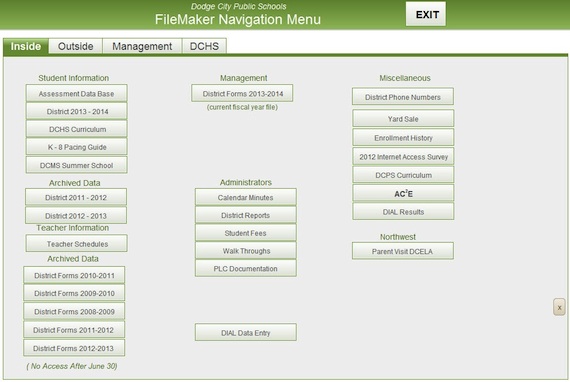Mobile Computing | Feature
Bringing Student Assessments to the iPad
Kansas school district develops a multifaceted, proprietary database platform to help teachers more efficiently administer and review student assessments.
- By Bridget McCrea
- 09/04/13
When Dodge City Public Schools in Dodge City, KS, started handing out iPads to teachers and students last year, Ray Wipf started thinking about how the devices' use could go beyond mobile apps, Web research, and note-taking. Knowing that the district's teachers were struggling to find efficient ways to deliver student assessments, Wipf, executive director of information management, came up with a homegrown way to address the problem.
As the core technology application, Wipf used FileMaker, a cross-platform relational database solution that three years earlier replaced a legacy, PC-based assessment system that was difficult to customize and required developer support and services. Previously used only on desktops and laptops, FileMaker now runs on all 1,200 of the district's iPads — a number that's expected to increase to 6,500 by 2014.
Online Assessments
Students in grades K-12 use their iPads to take their online assessments — based on multiple choice, true-false, and short answer questions — and teachers use the devices to track their scores and progress in real-time. Utilizing the database program, teachers can filter results across variables like areas of knowledge, weaknesses, and strengths. Wipf said live reporting was added in 2012 and that previously teachers had to wait two to three days to receive the assessment results.
After viewing the test results in chart, graph, or list form, teachers can quickly pick up on trends and target those students who need assistance in specific areas. Wipf said this instantaneous feedback has helped educators more quickly determine which students need the most help — and on which topics.
The district uses the Casper Suite in conjunction with its FileMaker database to manage and track its 1,200 iPads, which are distributed as follows: eight carts at its high school and middle schools and two carts at each of its elementary schools. Wipf pointed out that the iPads were not specifically acquired for assessments, but rather to "increase productivity and get our schools ready for 21st century learning."
Creating the Custom Database
Wipf said he selected FileMaker as the base for Dodge City Public Schools' custom database solution centered on his familiarity with the product and its capabilities. "I know how to program and I've used FileMaker a number of times in the past," stated Wipf. "When the district approved the budget to purchase a license for the product, FileMaker was installed on all desktops and laptops. A lot of districts don't like to touch every computer in order to install software," said Wipf, "but we decided the value of doing that would be justified."

Dodge City's custom FileMaker database splash screen. Click to view larger image. |
Wipf, who manages a fairly small IT department for one of the state's largest districts, said he's constantly working on the assessment system and honing it to meet the needs of teachers and students. "I basically sit back and listen to the users' wants, needs, and feedback," Wipf said. "I then go back and tweak things to meet those requests."
Every summer, for example, Wipf takes a hard look at how the district's custom database system performed during the previous school year. With a district-wide iPad rollout looming, he's giving the system an especially critical look right now. "It took a lot of effort to get to where we are today with delivering assessments and working out all of the bugs," said Wipf. "I'm now looking at what we learned last year and modifying the program to make it even better."
Wipf said that over the last three years Dodge City Public Schools' iPad-based assessment system has become "mission critical" for teachers who rely on the data and related reports to track student progress. Using the information stored in the system, the district is now developing a running record of reading levels with the goal of more accurately recording and tracking students' instructional needs. As part of that initiative, the system will be programmed to generate recommendations based on, say, low reading scores.
The district is expected to be home to 5,300 more iPads in the near future, with a deployment schedule being worked out this month. That will be enough for a 1-to-1 implementation for all 6,500 of its students. Beginning in January 2014, Wipf said, the devices will be distributed to one campus at a time. He said he expects the district to continue using its proprietary database solution for assessments but isn't sure what direction it will take when it comes to device management and tracking. "We're waiting to see if everything is approved for the implementation," said Wipf, "and then we'll take it from there."
About the Author
Bridget McCrea is a business and technology writer in Clearwater, FL. She can be reached at [email protected].